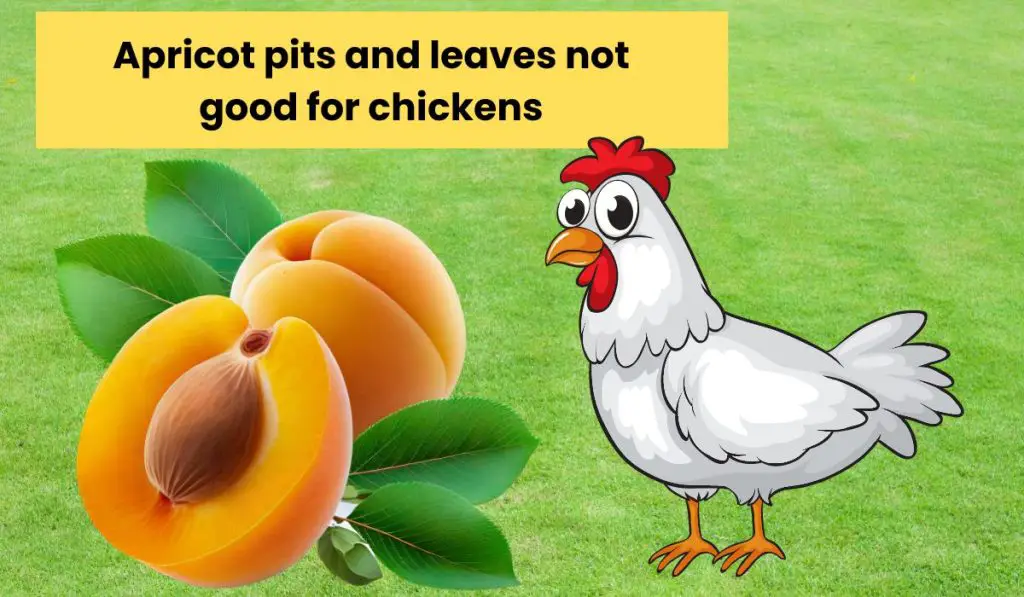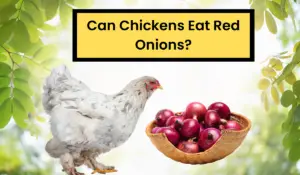The apricot is an orange-yellow fruit that has green leaves. Its smell is lovely. The skin of this fruit is smooth and velvety. I grow the plant for this fruit in my small garden, where I have already grown many flowers, including some fruits and vegetables. The flavor of this fruit is delicious and sweet. However, my chickens come into my garden to play and damage my plants when they wander. With their beaks, they also destroy freshly grown fruits and vegetables. That is why I always try to keep them away from my garden. I think we should get to the main point.
Can Chickens Eat Apricots?
Yes, surely your chicken can quickly eat apricots. Your fowl companions like to eat this fruit. Apricots are a very effective and healthy fruit for your chicken’s health. But avoid providing your chickens with the leaves, seeds, and stems of this fruit. You are alerted by this condition that these parts of this fruit can be poisonous to your hens. It can cause a fatal toxin called amygdalin, which transforms into cyanide after digestion in a small amount, which is unsuitable for your flock’s health.
Are Apricots Good for Chickens?
For the well-being of your flock, apricots are advantageous and profitable. Its high vitamin, mineral, and antioxidant content makes it very healthy. Minerals like calcium, potassium, sodium, and protein significantly influence your chicken’s health. Antioxidants aid free-radical defense in the body.
9 Advantages of Giving Apricots to Your Chickens:
Before using apricots for your chickens, you might be interested in the advantages of feeding apricots to your chickens, which are listed below.
Potassium
- Potassium is crucial for your chickens to carry out several bodily processes.
- It is also crucial for the maintenance of blood pressure.
- It helps prevent kidney stones in chickens.
- It aids in keeping your flock’s egg production levels stable.
- It is essential for the distribution of nutrients throughout the body.
- It protects your chicken’s heart health.
Provides Hydration
- In hot weather, fresh apricots keep your feathered friends hydrated because they contain more water than dried ones.
- The water content also aids in keeping the digestive tract in proper working order.
Antioxidants
- They are necessary for the immune system of hens.
- They help prevent the oxidation of fats and other harmful toxins that cause diseases like cancer.
- They prevent free radicals from destroying the body’s cells.
Fiber
- Soluble fiber promotes the growth of beneficial bacteria in the digestive tract and aids in water retention.
- Insoluble fiber is also advantageous for gut flora.
- It minimizes feather packing.
- It aids in the digestion process.
Proteins
Chickens need 17 to 18% protein, vital for laying hens’ diets.
Flavonoids
- It works to preserve and maintain the blood vessels.
- It also helps in decreasing signs of inflammation.
Vitamin A
- It promotes immunity functions.
- It supports the improvement of eye health.
- It is an essential nutrient for a chicken’s nose, esophagus, and skin of the inner eyelid.
Vitamin E
- Additionally, it helps shield the skin from UV rays.
- Enhances growth and reproduction.
- It is vital for the health of the nerves and the circulatory system.
- It aids in the prevention of new illnesses. It is a disease that affects the acute respiratory system and is present in domestic poultry.
- Egg production remains fertile thanks to it.
Lutein
- It contributes to healthier eggs for human consumption.
- When broiler chickens grow at high elevations, their growth performance and survival rate improve.
Are Dried Apricots Safe for Chickens to Eat?
Dried apricots contain little water and a lot of sugar. However, a high-sugar diet contributes to several health issues, including obesity. So, I advise against feeding dried apricots to your chickens. In addition, I only Feed my chickens fresh fruit, which is a good source of fiber and the vitamins A, E, and C.
Because they lack teeth, your chickens might find it challenging to consume dried apricots.
Included side effects:
- It causes high blood pressure levels.
- Your chickens also gain weight by overeating sugar.
- It also decreases egg production.

Are Apricot Seeds and Leaves Safe for Chickens to Eat?
Research shows that leaves, stems, and seeds contain amygdalin, which converts into cyanide after digestion. That isn’t good for your flock’s health. I didn’t give my chickens the leaves and other parts of this plant. Doing this will ensure that this food is safe for my fowl companions. If your chicken eats any part of the plant, it will face many health issues.
5 Facts About Apricots That You Might Not Know
Let me explain more about this topic. You might need to be aware of these details.
- This fruit contains no cholesterol, and sodium and saturated fat are absent.
- Apricot trees have a 20- to 25-year lifespan on average.
- The United States celebrates National Apricot Day, which is always held on January 9.
- Apricots ripen more slowly when stored in the refrigerator. They must wait until they are ready, keeping them at room temperature.
- The family of apricots includes roses.

How Are Apricots Fed to Chickens?
Washing apricots before giving them to your fowl friends would be best. You can chop it into small slices and serve it with your chickens. The skin of this fruit contains many chemicals and pesticides, so you need to remove it before feeding it to your chicken. Please omit the leaves, seeds, and stems before serving them to your flock.
How Often Should You Feed Apricots to Your Chickens?
It would be best if you fed apricots to your chickens only twice a week. However, continued use of everything could not improve your flock’s health.
Conclusion
Hence, apricots are a healthy snack for your fowl friends, but remember to avoid using other parts of this plant. You also give apricots to your chickens only in moderation.
Frequently Asked Questions:
Can Chickens Consume Apricot Skin?
Chickens can eat apricot skin, but only if it has been thoroughly cleaned and is devoid of any chemicals. The same beneficial nutrients in this fruit’s flesh are also in its skin.
Can Chickens Eat Apricots That Have Been Canned or Preserved?
You can give your chicken your canned or preserved apricots, but only in tiny quantities. Because the additional sugar is unsuitable for your chickens, as it comprises more preservatives, use it as little as possible.
Can Chickens Consume Apricot Jam?
Apricot jam or apricot preserves, like any sweet or refined food, should only be provided to your hens in a minor amount.
Can chickens eat apricots that aren’t fully ripe?
Although unripe apricots are more bitter, you can feed your chickens with them. However, the nutritional content is essentially the same except for the absence of the ripe fruit’s naturally occurring sugars. In the pits of unripe apricots, there is a less hazardous substance, amygdalin. With its over-ripening, the level of this toxic substance rises.
Can Baby Chickens Eat Apricots?
No, you didn’t give any apricots to your baby chickens. They won’t be able to be digested by them because their digestive systems haven’t fully matured yet. You can start giving the young chickens apricots when they are about three weeks old. Make sure to provide them with a small amount to eat.
What if My Chicken Consumes Apricot Leaves, Stems, and Seeds?
The amount consumed will determine how harmful it is to your chickens, their size, age, and how many there are. If your chicken eats apricot leaves and seeds, they may suffer more, whether young or old. It might result in negative consequences like breathing difficulties, panting, seizures, shock, low blood pressure, stomach upset, and diarrhea.



